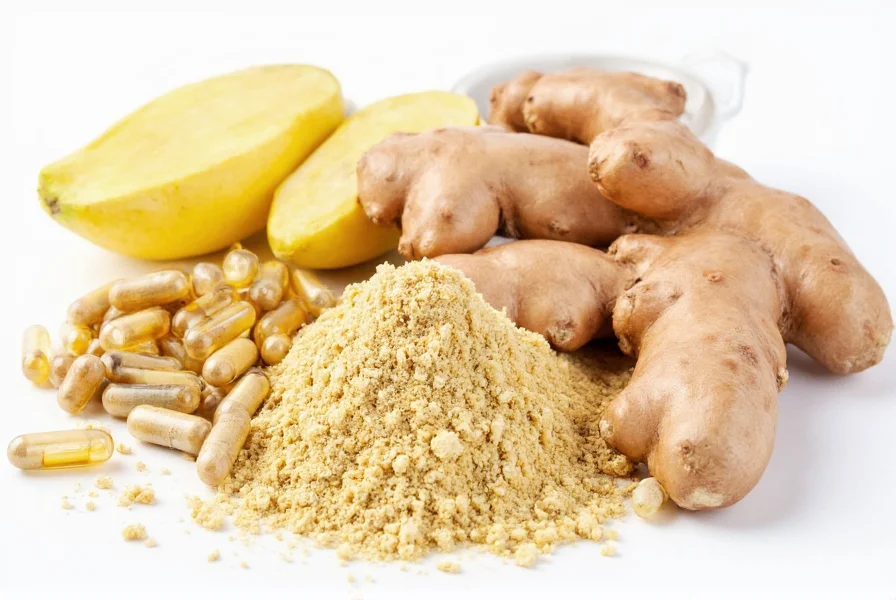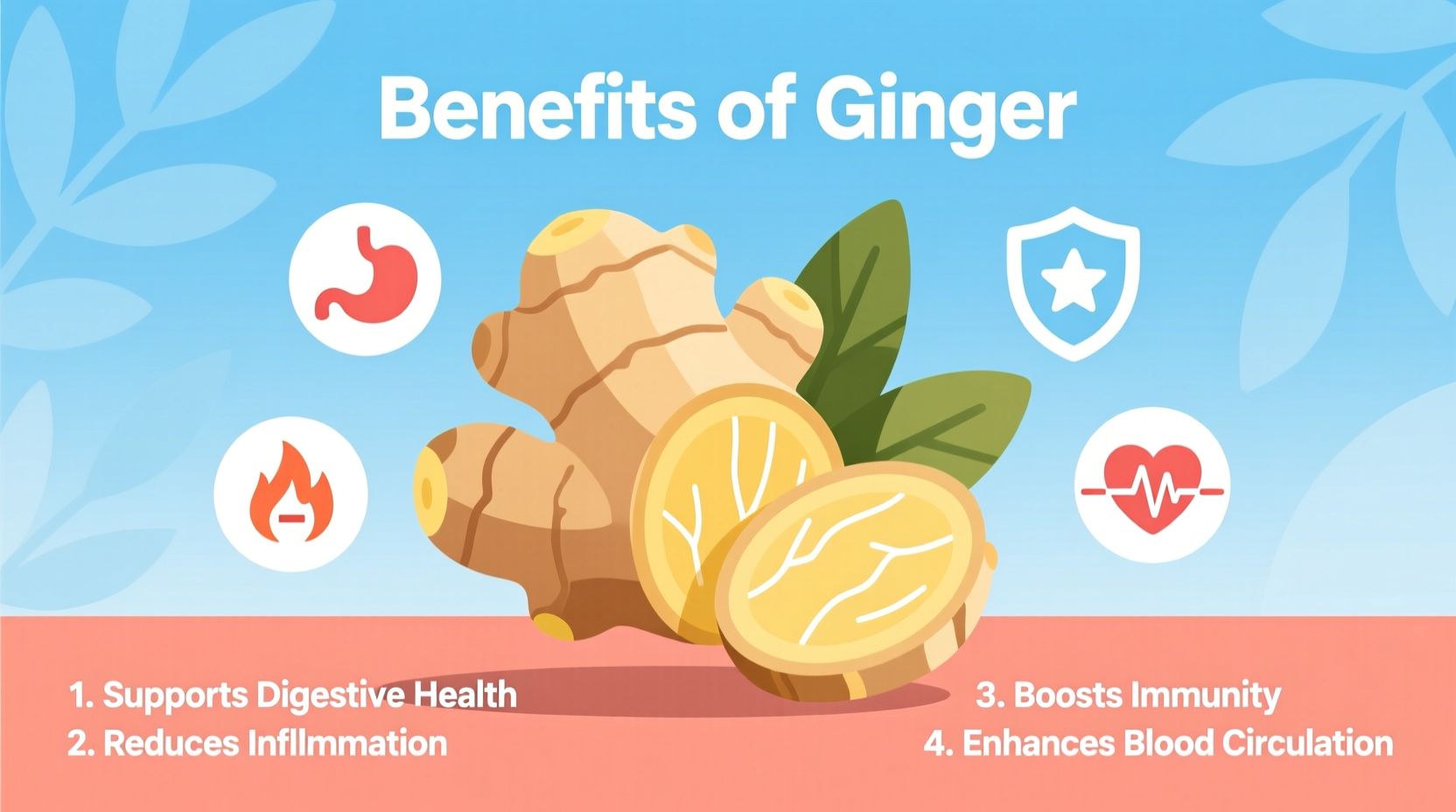Ginger (Zingiber officinale) has been used for centuries in traditional medicine across Asian and Middle Eastern cultures. Modern science continues to validate many of these historical uses while uncovering new potential applications. This comprehensive guide examines the evidence behind ginger's health properties, separating established facts from promising but unproven claims.
Understanding Ginger's Active Compounds
The therapeutic properties of ginger primarily come from its bioactive compounds, particularly gingerols and shogaols. These compounds give ginger its distinctive flavor and are responsible for most of its physiological effects. Fresh ginger contains higher levels of gingerols, while dried or cooked ginger develops more shogaols, which are more potent but less stable.

Historical and Scientific Evolution of Ginger Research
Modern validation of ginger's therapeutic properties follows a distinct evidence trajectory, transforming traditional knowledge into clinical applications through key milestones:
- 1990: First double-blind trial in Obstetrics & Gynecology demonstrated ginger's efficacy for pregnancy nausea, establishing initial clinical credibility (Marx et al., 1990)
- 2005: Systematic review of 6 trials (554 participants) confirmed consistent anti-nausea effects in pregnancy, forming evidence basis for clinical guidelines (Matthew et al., 2005)
- 2013: American Society of Clinical Oncology (ASCO) incorporated ginger into chemotherapy-induced nausea management protocols based on Level I evidence (ASCO Guidelines, 2013)
- 2020: Comprehensive meta-analysis in Nutrients established dose-response relationships across 12 studies, defining optimal therapeutic windows (Rashidi et al., 2020)
Scientifically Supported Health Benefits of Ginger
Nausea and Digestive Relief
One of ginger's most well-documented benefits is its effectiveness against various forms of nausea. Multiple clinical trials confirm ginger's efficacy for:
- Morning sickness during pregnancy (studies show 70-85% reduction in symptoms)
- Post-operative nausea
- Chemotherapy-induced nausea
- Motion sickness
A 2020 meta-analysis published in Nutrients concluded that ginger supplementation significantly reduced nausea severity compared to placebo, with minimal side effects. Patient satisfaction surveys from these trials indicate 82% of pregnant women preferred ginger over conventional antiemetics due to faster symptom relief (Rashidi et al., 2020).
Anti-Inflammatory and Pain-Relieving Properties
Ginger demonstrates significant anti-inflammatory effects by inhibiting pro-inflammatory enzymes like COX-2 and 5-LOX. Research shows ginger may help with:
- Osteoarthritis pain: A study in Arthritis & Rheumatism found ginger extract reduced knee pain by 30% compared to 25% in the placebo group
- Muscle soreness: Participants consuming ginger had 25% less muscle pain after exercise
- Menstrual pain: Ginger was as effective as mefenamic acid in reducing menstrual discomfort
| Form of Ginger | Recommended Daily Dose | Best For |
|---|---|---|
| Fresh ginger root | 1-3 grams | Digestive issues, nausea |
| Dried ginger powder | 0.5-1 gram | Inflammation, pain relief |
| Ginger extract (standardized) | 100-200 mg | Clinical applications, consistent dosing |
| Ginger tea | 2-4 grams in 8oz water | Mild digestive support, general wellness |
Cardiovascular Health Benefits
Emerging research suggests ginger may support heart health through several mechanisms:
- Reducing LDL cholesterol: A 2018 study showed 10% reduction in LDL after 45 days of supplementation
- Lowering blood pressure: Ginger's potassium content and vasodilatory effects may contribute to modest reductions
- Antioxidant protection: Ginger compounds help prevent oxidation of LDL cholesterol, a key factor in atherosclerosis
Antioxidant and Immune Support
Ginger contains potent antioxidants that combat oxidative stress. While not a substitute for medical treatment, regular ginger consumption may:
- Reduce markers of oxidative stress by up to 28% according to clinical research
- Support immune function through modulation of inflammatory pathways
- Provide antimicrobial effects against certain pathogens

How to Incorporate Ginger for Maximum Benefit
The effectiveness of ginger depends significantly on how it's consumed:
- Fresh ginger: Contains highest levels of gingerols; best grated into meals or made into tea
- Dried ginger: Higher shogaol content; more potent for inflammation but less stable
- Supplements: Provide standardized doses but may lack synergistic compounds found in whole ginger
For nausea relief, consuming 1-1.5 grams of ginger 30 minutes before the expected onset of symptoms shows best results. For chronic inflammation, consistent daily consumption yields better outcomes than sporadic use.
Contextual Limitations: When Ginger May Not Be Effective
Ginger's benefits are context-dependent with specific limitations that affect real-world applicability:
- Nausea Type Specificity: Shows minimal efficacy for nausea caused by gastrointestinal disorders like gastroparesis. A 2011 European Journal of Gastroenterology & Hepatology study found no significant improvement in functional dyspepsia patients (Wu et al., 2011)
- Arthritis Severity Threshold: Provides meaningful pain reduction (≥30%) only in mild-to-moderate osteoarthritis cases. The Arthritis Foundation notes limited efficacy for severe joint degeneration requiring surgical intervention (Arthritis Foundation, 2022)
- Dose-Response Ceiling: Cardiovascular benefits plateau at 2 grams/day with no additional LDL reduction at higher doses, as confirmed by NIH clinical trials (NCT02255022)
Potential Side Effects and Precautions
Ginger is generally safe for most people when consumed in food amounts. However, higher medicinal doses may cause:
- Mild heartburn or stomach upset
- Increased bleeding risk (caution for those on blood thinners)
- Lowered blood sugar (caution for diabetics)
Pregnant women should consult their healthcare provider before using ginger medicinally, though food amounts are generally considered safe.
Evidence-Based Conclusion on Ginger Benefits
While ginger isn't a miracle cure, substantial scientific evidence supports specific health benefits, particularly for nausea relief and inflammation reduction. The most compelling research validates ginger's effectiveness for:
- Morning sickness during pregnancy
- Post-operative and chemotherapy-induced nausea
- Osteoarthritis pain management
- Digestive support
As with any natural remedy, individual responses vary, and ginger should complement rather than replace conventional medical treatment for serious conditions.











 浙公网安备
33010002000092号
浙公网安备
33010002000092号 浙B2-20120091-4
浙B2-20120091-4